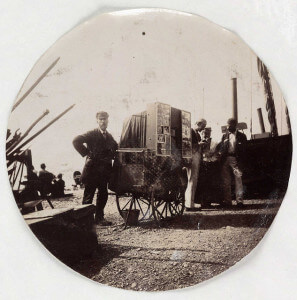
Some days you wake up and you see announcements of a new project to digitize a collection of primary source materials. Perhaps an archive that covers centuries of technological and commercial changes, perhaps a collection of newspapers that encompasses the history of African-American politics and culture, just to name a couple of purely hypothetical examples.
I don’t know any details about such agreements and neither do you, unless you happen to be one of the top-level executives at one of the holding institutions for these collections or at one of the companies doing the digitization. And because we don’t know any details, we don’t know whether such projects are great or not. But we can—and we should—ask some questions when we hear about them:
- Who financially benefits from such agreements? It is certainly the company doing the digitization and the institution holding the documents, otherwise neither would be doing it. But sometimes researchers forget that the primary impetus for commercial enterprises isn’t to enable access to cultural heritage materials but to make money. And cultural heritage institutions have not always prioritized open access to their collections over monetizing them, either.
- Who is going to have access to the resulting images? In commercial partnerships, the projects are typically limited to institutions who can pay to subscribe to the commercial database. Some databases are available on a stand-alone basis, others are only available as part of a bundle. If the digitized documents are owned by a single institution, the digitizations might be available for free to staff and researchers on site at that institution, although being available on site does not mean that they escape the limitations of licensing.
- Who is not going to have access to the images? I’m asking this question twice because I want to highlight how important it is: depending on the cost of the database, it could be excluding a majority of scholars affiliated with a higher-education institution. (Many of you reading this won’t have access.) More importantly, it will certainly be excluding researchers not affiliated with such an institution. (I won’t have access.) For collections that are undoubtedly part of our universal cultural heritage, that’s an issue that needs to be confronted. (Some secondary schools and public libraries do subscribe to some of these databases; it depends on the subject matter and the cost.)
- What will you be able to do with the resulting images? Most commercial databases retain copyright over their digitized products and do not license them beyond personal use. If you want to reuse them on your blog, if you want to include them in your dissertation, if you want to repurpose them in your research, you often need to seek their permission.
- How will this impact the ability of researchers to access the original documents? If you are a researcher who does not have access to the digital images, how will you be able to access the materials? Funding institutions tend to prioritize scholars who are working with primary sources, and they tend to define primary sources as material texts rather than digital ones. If you are a holding institution that will be restricting access to your newly digitized collection, will you help fund scholars to come use your database if their institution doesn’t subscribe to it?
I do not know the details of such agreements between libraries and archives and the commercial enterprises that digitize and sell their collections. I cannot say unequivocally that these agreements are good or bad things. Digitization can be very expensive; digital access can be very powerful. Balancing the two sides is complicated. But researchers and librarians should ask themselves this list of questions before cheerleading announcements.
Ideally, we shouldn’t just be responding to announcements, but taking proactive steps. We should be asking ourselves how can we balance the desire to have digital access to the rare materials we want with the recognition that libraries and archives and museums cannot simply bear the brunt of the cost of doing it themselves. Do you value access to digital collections? What are you doing to support the work of libraries and openly accessible research materials? What are the ways that we—whether we work in libraries and museums as staff or as researchers—can create high quality digitizations without selling our cultural heritage to the highest bidder?
Thanks for another trenchant post that asks all the right and pressing questions! I’ve shared it with my English 500 class and encouraged them to follow you.